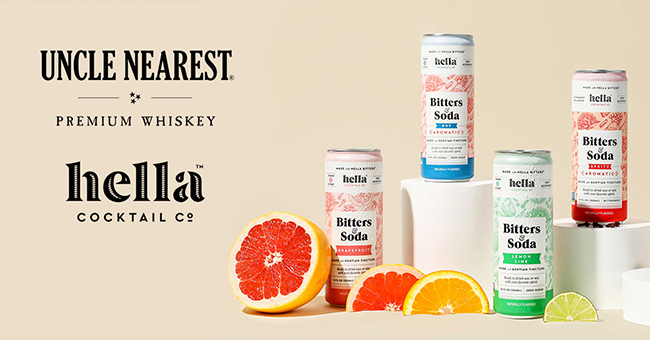
Hella Cocktail Co. has raised $5 million in a Series A funding round, fully backed by premium spirits brand Uncle Nearest, the company announced today.
Founded in 2012 by CEO Jomaree Pinkard, CMO Eddie Simeon, and COO Tobin Ludwig, New York-based Hella produces a variety of cocktail bitters and mixers, as well as a ready-to-drink Bitters & Soda line. While the brand previously raised seed funding, the Series A marks the first major capital round for Hella and will help the brand expand its omnichannel business across retail, on-premise and ecommerce.
Speaking with BevNET today, Pinkard said the relationship with Tennessee-based Uncle Nearest, a Black-owned whiskey distiller founded in 2017, began around February 2021 when both companies were being frequently featured in bar and spirits industry programs centered around BIPOC-led brands. Through numerous liquor store and event activations, Pinkard said he and Uncle Nearest founder and CEO Fawn Weaver established a rapport which led them to realize they “had a lot of alignment in terms of our brands’ eyes and DNA.”
In June 2021, Uncle Nearest launched a $50 million venture fund to invest in minority-owned spirits and cocktail brands and, after months of collaborations, Hella became one of its earliest potential targets for investment.
“To the credit of Uncle Nearest and their venture firm, they’re not looking to capitalize for a quick ROI hit and return, they’re looking to build legacy brands,” Pinkard said. “And so that was the real meat and potatoes of all of our conversations, and the reason that the deal was done. This is a long term play with support ongoing.”
Pinkard highlighted Uncle Nearest’s ability to “tell great stories” and the opportunity for Hella to “plug into the narrative itself” and raise brand awareness will be one of the key priorities for the partnership. The two companies will tap each other’s sales teams to expand in additional channels and Uncle Nearest’s presence in on-premise accounts will help Hella to grow in bars and restaurants, Pinkard added.
“Investing in Hella Cocktail Co. was an absolute no-brainer,” Weaver said in a press release. “Our team members were already pairing their Bitters & Soda with Uncle Nearest, so I knew their products were made with excellence. What I didn’t know is the brand was founded by three men of African-American, Mexican, and Jewish descent. Once I learned that, I reached [out] to Jomaree and said, ‘What do you need? It’s yours.’”
While co-branded products are a future possibility, Pinkard said there’s no immediate plans for innovation collaborations and the companies haven’t discussed those opportunities.
“Right now we’re handling the blocking and tackling of due diligence and making things work from an infrastructure standpoint, which I think has way more immediate benefits in terms of integrating sales teams, and storytelling, which we think at the highest level has the most earned media effects, as well as boots on the ground,” he said. “So I think those things are like brass tacks and we’ll get to the organic stuff a little bit later.”
Hella’s products are currently available in about 20,000 points of distribution nationwide and the company has set a goal to sell 200,000 to 250,000 cases by the end of the year. According to Pinkard, about 60% of Hella’s business is in retail – a reversal from the pre-pandemic period when it was more prevalent in bars and restaurants – but he hopes to equalize revenue between retail, on-premise and food service, and ecommerce in the near future.
Among its product offerings, bitters and mixers each comprise about 40% of revenue while the Bitters & Soda line makes up the remaining 20%, he said. But Pinkard sees the RTD line as having the highest growth potential, noting its crossover appeal as a mocktail and an anytime refreshing beverage, and hopes to eventually scale the line to make up about 75% of total sales.
Hella is currently looking to hire a national account director and a retail chain director to support the expansion, but despite the new funding Pinkard still plans to take a cautious approach to growth.
Although the company has taken minimal investment to date, it’s not been for a lack of trying; Pinkard noted that because bitters and mixers rarely produce the same multiples as spirits brands, it’s been difficult to find venture funding in the alcohol space. Meanwhile, food and beverage financiers have viewed the company as being too alcohol adjacent. However, he called Hella’s past difficulties finding financing “a blessing in a lot of ways” as bootstrapping the company has led it to be more efficient and taught him to be selective in choosing investment partners.
“The journey that we’ve all collectively been on, it’s really been about choice,” he said. “We’re not doing these things because we ran out of money or because we don’t have the right suitors. It’s because we’re choosing these partners and making that choice, not only in terms of our category and what we stand for, which is elevated beverages and elevated cocktailing, but also our own journey. We want to make sure that we acknowledge that these are our choices that we make, and that through line is what connects the brand to everything we do and the people inside and outside of it.”